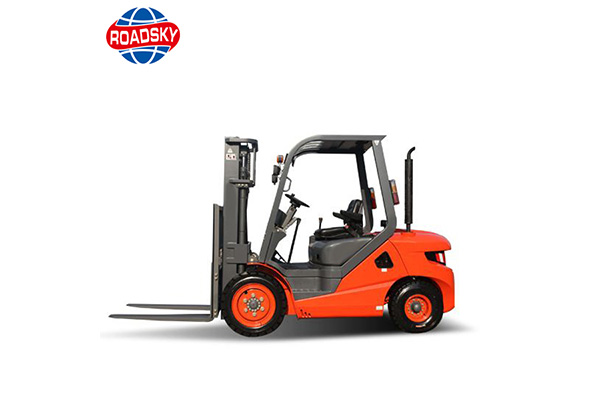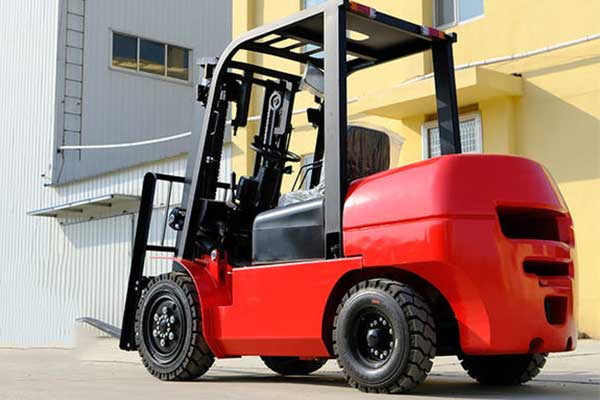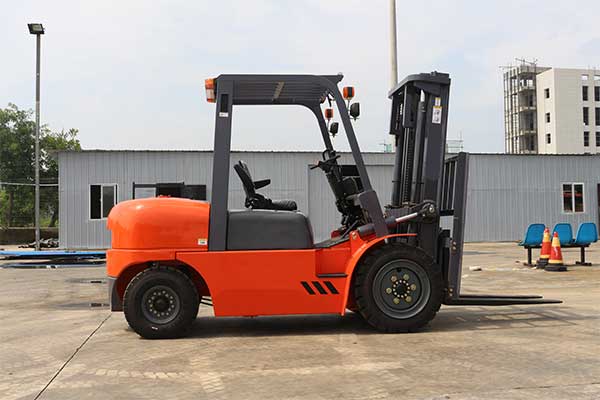What is a Diesel Forklift? A Comprehensive Guide
Forklifts are essential machines in various industries, playing a crucial role in transporting heavy loads across warehouses, construction sites, and shipping yards. One of the most common types of forklifts is the diesel forklift. But what exactly is a diesel forklift, and why is it favored in so many industrial settings? This article will explain the basics, advantages, applications, and key considerations when using a diesel forklift.

What is a Diesel Forklift?
A diesel forklift is a type of forklift that runs on diesel fuel, a heavy-duty fuel commonly used in industrial machinery. Diesel forklifts are equipped with powerful internal combustion engines, which makes them suitable for heavy lifting and outdoor operations. These forklifts are designed for rugged environments and are commonly used in industries such as construction, logistics, and manufacturing.
How Does a Diesel Forklift Work?
A diesel forklift operates using an internal combustion engine powered by diesel fuel. The engine produces the necessary torque to drive the wheels and lift the load. Key components of a diesel forklift include:
- Diesel Engine: The heart of the forklift, responsible for generating power to move and lift heavy loads.
- Mast: The vertical structure that supports the forks and allows for lifting and lowering loads.
- Forks: Horizontal blades that slide under the load to lift and transport it.
- Counterweight: A weight located at the rear of the forklift to balance heavy loads lifted by the forks.
Diesel forklifts often come in various models with different load capacities, ranging from 1.5 tons to over 10 tons, allowing them to handle diverse types of goods and materials.

Key Advantages of Diesel Forklifts
- Power and Performance: Diesel forklifts offer significant power, making them ideal for heavy-duty applications. They can lift large and heavy materials, making them the preferred choice for construction sites and outdoor environments.
- Durability: Built to last, diesel forklifts are designed for tough conditions, including rough terrains. They are more robust compared to electric forklifts, which makes them reliable for long hours of continuous operation.
- Lower Fuel Costs: Diesel fuel is often more cost-effective compared to other energy sources like electricity. While diesel prices fluctuate, its availability ensures that businesses in remote or high-demand areas can still operate forklifts without downtime.
- Longer Operation Time: Diesel forklifts can operate for longer periods on a single tank of fuel compared to battery-powered forklifts, which require charging. This makes them suitable for operations requiring continuous usage throughout the day.
- Faster Refueling: Unlike electric forklifts that require hours to recharge, diesel forklifts can be refueled quickly, minimizing downtime during shifts.
Applications of Diesel Forklifts
Diesel forklifts are widely used in industries that require high power and the ability to operate in tough environments. Some typical applications include:
- Construction Sites: Moving heavy building materials such as concrete, steel beams, and timber.
- Warehousing and Logistics: Transporting heavy pallets and large goods across large outdoor spaces.
- Shipping Yards and Ports: Loading and unloading heavy containers from trucks or ships.
- Manufacturing: Handling large machinery parts, raw materials, and finished goods.

Considerations for Using Diesel Forklifts
- Environmental Impact: Diesel forklifts produce emissions that may not be suitable for indoor use due to the potential release of harmful gases such as carbon monoxide. For indoor operations, electric forklifts are preferred.
- Noise Levels: Diesel engines tend to be noisier than their electric counterparts. This may be a factor to consider in noise-sensitive environments.
- Maintenance: Diesel forklifts generally require more frequent maintenance due to the complexity of their engines and fuel systems. Regular checks are necessary to ensure optimal performance and longevity.
- Fuel Storage: Businesses need to manage and store diesel fuel safely on-site. Adequate storage facilities and adherence to safety regulations are crucial when operating diesel-powered equipment.
Diesel Forklift vs. Electric Forklift: Which is Better?
The choice between a diesel forklift and an electric forklift depends on the specific needs of your business. Here’s a quick comparison:
- Power: Diesel forklifts are more powerful and can handle heavier loads, while electric forklifts are better for lighter duties.
- Environment: Diesel forklifts are best for outdoor use, especially on rough terrains, while electric forklifts are ideal for indoor use where zero emissions and quieter operation are required.
- Fueling vs. Charging: Diesel forklifts offer quick refueling times, whereas electric forklifts require downtime for battery charging.
Conclusion
A diesel forklift is a powerful and reliable machine suited for heavy-duty tasks in outdoor and industrial environments. It offers significant advantages in terms of power, durability, and operational efficiency, making it ideal for industries like construction, warehousing, and logistics. However, businesses must also consider environmental impacts, noise, and maintenance requirements when choosing the right forklift for their operations.
Whether you’re looking to handle heavy loads on rough terrains or need long-lasting power for continuous operations, diesel forklifts are an excellent choice for many industrial applications.
FAQs
Diesel forklifts are typically used for outdoor operations or in large, open spaces where heavy loads need to be moved. They are commonly employed in construction, manufacturing, shipping yards, and large warehouses due to their ability to handle heavy-duty tasks and rugged terrains.
While diesel forklifts are technically capable of operating indoors, they are generally not recommended for enclosed spaces due to their emissions and noise levels. The exhaust fumes produced can be hazardous to health unless the area is well-ventilated. Electric forklifts are a better option for indoor use.
The weight capacity of a diesel forklift depends on the model and size. Diesel forklifts typically range from lifting 1.5 tons to over 10 tons, making them versatile for various industrial applications. Larger models can lift even heavier loads.
Diesel forklifts require regular maintenance to ensure optimal performance and prevent engine or fuel system issues. Depending on usage, general maintenance, such as oil changes, filter replacements, and checking the hydraulic system, should be performed every 250 to 500 operating hours.
With proper maintenance, diesel forklifts have a long lifespan, often lasting 15,000 to 20,000 hours of operation. Regular servicing can extend their longevity even further.
Diesel forklifts may have lower initial costs compared to electric models, but they can be more expensive to run in terms of fuel and maintenance. However, they offer higher power and are better suited for certain environments and heavy-duty tasks, which can justify the operating costs.
Yes, forklift operators, including those using diesel forklifts, need proper training and certification to ensure safety. Different countries or regions may have specific regulations, but in general, operators must complete a certified forklift training program to obtain a license.

